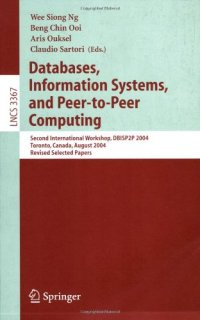
Ebook: Databases, Information Systems, and Peer-to-Peer Computing: Second International Workshop, DBISP2P 2004, Toronto, Canada, August 29-30, 2004, Revised Selected Papers
- Genre: Education // International Conferences and Symposiums
- Tags: Database Management, Information Storage and Retrieval, Information Systems Applications (incl.Internet), Computer Communication Networks, Software Engineering, Artificial Intelligence (incl. Robotics)
- Series: Lecture Notes in Computer Science 3367 : Information Systems and Applications incl. Internet/Web and HCI
- Year: 2005
- Publisher: Springer-Verlag Berlin Heidelberg
- Edition: 1
- Language: English
- pdf
Peer-to-peer (P2P) computing promises to o?er exciting new possibilities in d- tributed information processing and database technologies. The realization of this promise lies fundamentally in the availability of enhanced services such as structured ways for classifying and registering shared information, veri?cation and certi?cation of information, content-distributed schemes and quality of c- tent, security features, information discovery and accessibility, interoperation and composition of active information services, and ?nally market-based me- anisms to allow cooperative and non-cooperative information exchanges. The P2P paradigm lends itself to constructing large-scale complex, adaptive, - tonomous and heterogeneous database and information systems, endowed with clearly speci?ed and di?erential capabilities to negotiate, bargain, coordinate, and self-organize the information exchanges in large-scale networks. This vision will have a radical impact on the structure of complex organizations (business, scienti?c, or otherwise) and on the emergence and the formation of social c- munities, and on how the information is organized and processed. The P2P information paradigm naturally encompasses static and wireless connectivity, and static and mobile architectures. Wireless connectivity c- bined with the increasingly small and powerful mobile devices and sensors pose new challenges to as well as opportunities for the database community. Inf- mation becomes ubiquitous, highly distributed and accessible anywhere and at any time over highly dynamic, unstable networks with very severe constraints on the information management and processing capabilities.
This book constitutes the thoroughly refereed postproceedings of the Second International Workshop on Databases, Information Systems, and Peer-to-Peer Computing, DBISP2P 2004, held in Toronto, Canada in August 2004 in conjunction with VLDB 2004.
The 14 revised full papers presented together with an invited keynote paper were carefully selected during two rounds of reviewing and improvement. The papers are organized in topical sections on query routing and processing, similarity search in P2P networks, adaptive P2P networks, and information sharing and optimization.